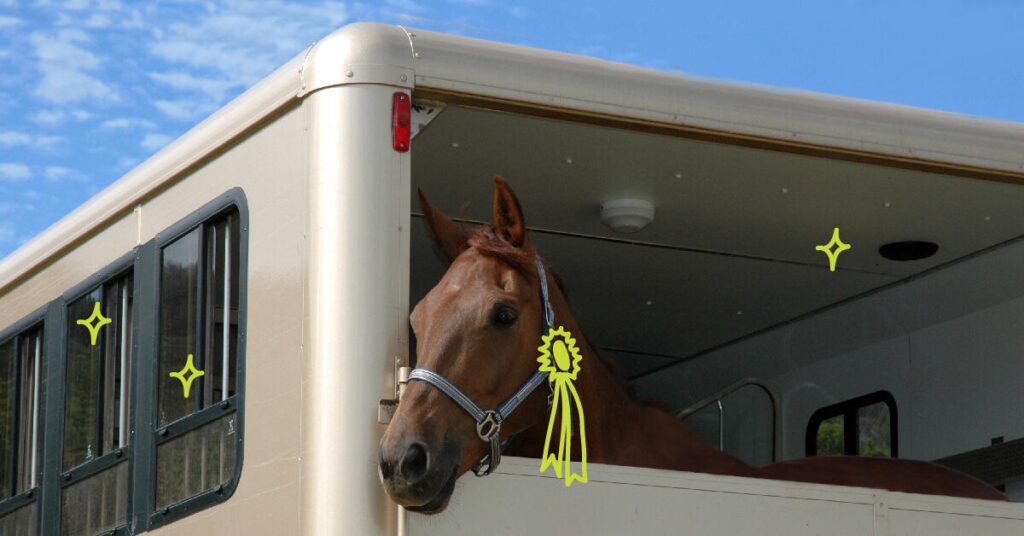Nutrition Strategies for Easing Equine Travel Stress
Your clients with performance horses have precise nutrition demands for their equine athlete. While diet is integral to maintaining health year-round, the feeding and hydration choices made leading up to, and during, travel for competition can sometimes make the difference between winning and losing.

With so much at stake for the owner and the horse, your recommendations for stress relief can make a significant difference.
The equine experts at Sentinel® Horse Nutrition are dedicated to helping you protect your patients and help them perform their best. The Sentinel team includes Dr. Randel Raub, director of research and nutrition, and Kristyn Sturken, equine product manager, who have collected insights and tips for helping horse owners manage equine travel. Share these recommendations so they can provide stress relief and help owners focus on the essentials for transporting horses and preparing for competition.
Nutrition at home and on the road
Feeding a performance horse means optimizing stamina, strength and recovery—whether eventing, show jumping, dressage, barrel racing or another competitive discipline. Further, travel, heat and exercise can take a heavy toll, so owners hoping to gain an advantage need a nutrition plan that helps a competitive horse meet its specific needs.
“The higher your performance expectations become, the more accurate your nutrient delivery has to be,” Raub said. “It’s no different than our human Olympic athletes, for example. They're not eating willy-nilly. Rather, it’s a very regimented, controlled, precise nutritional program, and that’s how you need to approach it with high-end performance horses.”
“There is no magic bullet nutrient, so it’s the complement of vitamins, minerals, protein and calories that help to drive that equine athlete.”
“The higher your performance expectations become, the more accurate your nutrient delivery has to be.” - Dr. Randel Raub, director of research and nutrition
What additional risk does a performance horse face while traveling?
“We have to worry about both nutritional and environmental stressors in all horses. For performance horses that are traveling, just putting a horse on the trailer adds significant stress,” Sturken said. “A couple health issues of concern include gastric ulcers and other digestive upsets significantly affected by stress.”
How can my clients prepare for equine travel?
Consistent diet: Maintain a horse’s regular feeding schedule leading up to the competition, as abrupt changes may cause digestive upsets.
Maintain hydration: Ensure the horse stays well-hydrated before leaving for a competition, as dehydration and electrolyte imbalances may lead to poor performance or health concerns.
Digestive health support: Consider a gastric support supplement to maintain proper pH levels and support gut health prior to, during and after travel.
“We have to worry about ulcers in performance horses because they’re under a lot of stress.” - Kristyn Sturken, Sentinel equine product manager
What needs to be done before considering a gastric support supplement?
Before adding anything to a horse’s diet, it’s important to note their body condition and take inventory of what they’re getting nutritionally. Take into account the horse’s workload, discipline and any special nutrition requirements.
“Regular forage testing can help identify gaps in nutrition. Consulting with an equine nutritionist ensures that supplementation aligns with the horse’s specific needs, workload and environmental factors.”- Kristyn Sturken, Sentinel equine product manager
What are the essentials of diet and nutrition for horses while traveling?
Forage access: High-quality hay should always constitute the majority of a horse’s diet. While traveling, owners should provide access to quality forage, which stimulates saliva production, buffers the stomach from acid and supports gut health.
Water availability: Encourage your clients to offer water regularly during travel. If their horse is reluctant to drink, they should consider adding an electrolyte supplement.
Consistency is key: Stick to the same feed types, including hay. When on the road, horses should be kept as close as possible to the same feeding times as they would feed at home. Deviating from habits can introduce stress. Maintaining a consistent schedule helps a performance horse know it can depend on the timing of its next meal even while many other variables are changing around it.
Timing is everything: When exercise or event times approach, avoid feeding a large grain meal as it could increase digestive discomfort.: When exercise or event times approach, avoid feeding a large grain meal as it could increase digestive discomfort.
Recognize signs of travel stress and provide relief
“Trailering is one of the most stressful things a horse can experience,” Dr. Raub said, “and obviously, performance and competition are strenuous activities too. The combination of stressors brings with it multiple risks.”
“With stressor events comes compromised immunity,” Raub said. “So we’re also concerned in the performance horse with some elements of nutrition, particularly prebiotics and some other elements that we incorporate into feeds to help address maintaining a greater immune response, primarily by making sure we’re doing as much as we can to maintain a healthy GI, a healthy gut.”
Are any feed types helpful for high-stress situations?
“There has been research that suggests a lower-starch and lower-sugar feed may sometimes benefit certain horses,” Sturken said.
Feeds low in starch and sugar typically have higher fat content. This type of feed has been shown to pair well with a horse getting the majority of its calories from high-end digestible and highly fermentable fiber. When looking for complements to low-starch, low-sugar feed, beet pulp and high-quality hay can provide an excellent source of carbohydrates. Quality fat sources for this type of diet might include vegetable oils and flaxseed.
“Anxious or nervous horses may stay calmer because they’re not getting spikes in blood sugar, and on the behavior side you also may notice more willingness to perform because the horse is feeling at its best,” Sturken said.
Some riders and trainers have reported beneficial behavioral differences from feeds low in starch and sugar.
“Observational data and unsolicited feedback from trainers tell us that horses on diets that are lower in soluble carbohydrates seem to have just a little calmer demeanor on average,” Dr. Raub said.
Get more horse diet and nutrition questions answered
The excitement of competition provides a rush for everyone connected to it, and Sentinel experts want to support your patients so that your clients can achieve their goals. Our commitment to helping horses lead healthier lives includes research, innovation and extending advice to veterinarians whenever possible.
The Sentinel team can help you make the best nutritional decisions for your horse and the horses under your care. Sign up for the latest news, research and expert nutritional guidance for all horses.

